Lately, I’ve seen many of my friends posting on Facebook that they watched an older movie, such as “Breakfast at Tiffany’s” or “My Fair Lady.”
Their commentary mostly complains about either racism or misogyny.
I then started thinking about when I watched “Sixteen Candles” a few months ago. I was streaming it, and the video and sound somehow lost their sync, so I was looking at reviews to see if other users had the same issue. Most of the reviews complained about the racism and misogyny inherent in the film. The commenters also called for the streaming service to remove the movie entirely.
I admit some words used in the movie have a completely different tone than they do now, and one of the characters portrayed would not fly now.
Another example is when “Gone With the Wind” was removed because at least one character was a slave. (I haven’t watched that one, so I’m going off of what I’ve read.)
Removing all movies and TV shows that don’t align with our current standards is missing the mark.
I think that it doesn’t challenge people. Instead of watching a movie, understanding it was a product of its time, and having thoughtful discussions on what was wrong with it, it gets swept under the rug, hopefully, to never be seen again.
We work on maitri, the practice of self-love and self-kindness, but I think we need to practice cultural maitri, too.
For personal maitri, we recognize that we’ve done some not-so-great things in our past. Hindsight is usually 20-20, after all. We can beat ourselves up over it or pretend like it never happened, but that doesn’t work so well. It usually ends up in us hating ourselves or blowing up out of nowhere for “no apparent reason.” With maitri, we recognize this and work on accepting our past, accepting who we are, and moving forward while trying to do better now that we know better.
We can do that with our movies and TV shows. Disclaimers are a great way to set the tone, letting the viewer know that what they are watching was created during a different time and “viewer discretion is advised.” As individuals, we can set aside the need for the show to be perfect. It’s similar to suspending disbelief in a superhero movie. We know people don’t have superhuman strength, can’t fly without assists, and can’t move things with our minds. We can do that with misogyny and racism in movies, too.
We can also discuss what people see in these movies and how some things don’t apply to real life anymore. In “That Touch of Mink,” Dorris Day’s character goes to an automat where fresh food is served through a vending machine-like system. We are unlikely to see that in our current lives. We can laugh about some of the absurdities we see, because again, in hindsight, things have changed.
We can recognize that events in the past are exactly that, and we can learn from them. We can see how far we’ve come as a society and celebrate that while realizing we still have some work to do.
What are some areas that you would like to see more cultural maitri?
~












Read 18 comments and reply